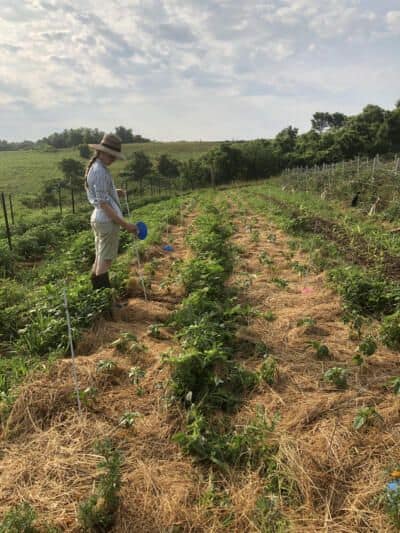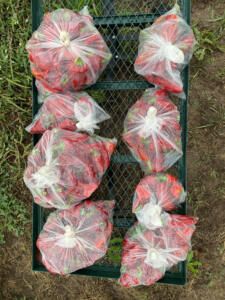Returning to My Roots
Growing as an Advocate and Farmer Through My Internship with OFRF
Written by Dakota Moore. Dakota was a Research & Education Intern with OFRF for summer and fall, 2024. Here he shares a guest post reflecting on his experiences and lessons learned.
As I wrap up my internship with the Organic Farming Research Foundation (OFRF), I find myself reflecting on the wealth of knowledge, connections, and inspiration I’ve gained during this transformative experience. Serving as a Research and Education Intern has been more than just an opportunity to contribute; it’s been a chance to grow as a professional, a farmer, and an advocate for organic agriculture.
During my time at OFRF, I had the privilege of engaging with some of the most current and impactful research in the organic farming sector. Supporting the development of OFRF’s online research hub introduced me to loads of peer-reviewed studies and resources on topics ranging from soil health and water dynamics to weed suppression and innovative crop management practices. Diving into these materials not only expanded my technical knowledge but also reinforced the critical role of research in shaping sustainable agriculture.
 I also had the unique opportunity to join OFRF’s Seeds of Success webinar series. I was a presenter in the session “Adding the O: Farmer Perspectives on Transitioning to Organic”. Sharing insights with a diverse audience of organic farmers, educators, and advocates was both an honor and a testament to how far I’ve come in my organic journey. The experience deepened my understanding of the challenges and opportunities within the organic sector while emphasizing the importance of collaboration and education.
I also had the unique opportunity to join OFRF’s Seeds of Success webinar series. I was a presenter in the session “Adding the O: Farmer Perspectives on Transitioning to Organic”. Sharing insights with a diverse audience of organic farmers, educators, and advocates was both an honor and a testament to how far I’ve come in my organic journey. The experience deepened my understanding of the challenges and opportunities within the organic sector while emphasizing the importance of collaboration and education.
With this wealth of knowledge, I am excited to return to my family’s operation, Moore Family Farms, as farm manager. My father and I have been working together to revitalize our farm’s legacy, established in 1833, through organic, sustainable, and regenerative practices. Armed with new strategies and resources from OFRF, I am eager to apply what I’ve learned to improve soil health, implement effective crop rotations, and strengthen our resilience against environmental challenges.
In addition to managing the farm, I am actively seeking career opportunities within the organic sector. Whether it’s through research, education, or advocacy, I want to continue contributing to initiatives that support organic farmers and advance sustainable practices. The insights I’ve gained at OFRF have ignited a passion for connecting farmers with the tools and information they need to succeed, and I’m excited to carry this forward into my next chapter.
I am incredibly thankful to the team at OFRF for their support and mentorship throughout this internship. This experience has been instrumental in shaping my perspective on organic agriculture and reaffirming my commitment to this field. From discovering new research to sharing insights in webinars, I leave this role with a deeper understanding of the organic sector and a renewed drive to make a difference.
As I return to my roots on the farm and explore new professional paths, I carry with me the lessons and inspiration gained at OFRF. To those considering a role in organic farming or advocacy, I encourage you to dive in. There’s so much to learn, share, and grow.
Here’s to a future of sustainable agriculture and organic success!

Dakota Moore
Farm Manager and Organic Advocate, Moore Family Farms














